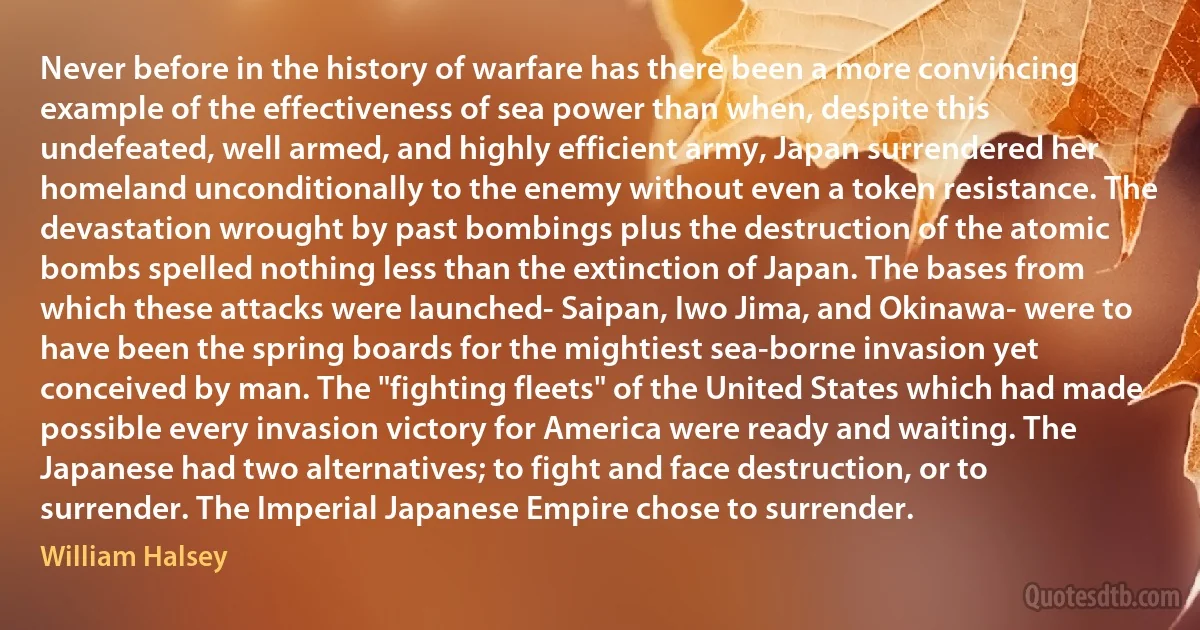
Never before in the history of warfare has there been a more convincing example of the effectiveness of sea power than when, despite this undefeated, well armed, and highly efficient army, Japan surrendered her homeland unconditionally to the enemy without even a token resistance. The devastation wrought by past bombings plus the destruction of the atomic bombs spelled nothing less than the extinction of Japan. The bases from which these attacks were launched- Saipan, Iwo Jima, and Okinawa- were to have been the spring boards for the mightiest sea-borne invasion yet conceived by man. The "fighting fleets" of the United States which had made possible every invasion victory for America were ready and waiting. The Japanese had two alternatives; to fight and face destruction, or to surrender. The Imperial Japanese Empire chose to surrender.
William HalseyRelated topics
army atomic base chose devastation effectiveness enemy example extinction face fighting fight history imperial japan less man mighty nothing past possible power ready sea spring token victory waiting warfare well work yet statesRelated quotes
But we are not here to applaud manly courage, save as it has been displayed in a noble cause. We must never forget that victory to the rebellion meant death to the republic. We must never forget that the loyal soldiers who rest beneath this sod flung themselves between the nation and the nation's destroyers. If today we have a country not boiling in an agony of blood, like France, if now we have a united country, no longer cursed by the hell-black system of human bondage, if the American name is no longer a by-word and a hissing to a mocking earth, if the star-spangled banner floats only over free American citizens in every quarter of the land, and our country has before it a long and glorious career of justice, liberty, and civilization, we are indebted to the unselfish devotion of the noble army who rest in these honored graves all around us.

Frederick Douglass
What makes you think human beings are sentient and aware? There's no evidence for it. Human beings never think for themselves, they find it too uncomfortable. For the most part, members of our species simply repeat what they are told-and become upset if they are exposed to any different view. The characteristic human trait is not awareness but conformity, and the characteristic result is religious warfare. Other animals fight for territory or food; but, uniquely in the animal kingdom, human beings fight for their 'beliefs.' The reason is that beliefs guide behavior which has evolutionary importance among human beings. But at a time when our behavior may well lead us to extinction, I see no reason to assume we have any awareness at all. We are stubborn, self-destructive conformists. Any other view of our species is just a self-congratulatory delusion. Next question.

Michael Crichton
This trendy, new crowd, which likes to do everything with committees, really believes that all it takes to make anything legal and OK is a majority. I guess they call that democracy. When the majority is what it has become in the United States today, a better name is mobocracy. But really, it's much worse than mob rule. It is rule by a self-appointed elite of utterly evil and destructive people who have in their hands the tools for controlling and guiding the mob. They're pretty cocky now -- so cocky, in fact, that they're making statements of the sort I've quoted today. They're cocky because they believe that no one can take away from them their tools for controlling the mob, and that as time passes and America becomes darker and more degenerate, their grip on the mob will only become firmer. Our job is to prove them wrong. It's a big job, and we'd better get started.

William Luther Pierce
For what advantage is it, that the world enjoys profound peace, if thou art at war with thyself? This then is the peace we should keep. If we have it, nothing from without will be able to harm us. And to this end the public peace contributes no little: whence it is said, ‘That we may lead a quiet and peaceable life.' But if any one is disturbed when there is quiet, he is a miserable creature. Seest thou that He speaks of this peace which I call the third (inner, ed.) kind? Therefore when he has said, ‘that we may lead a quiet and peaceable life,' he does not stop there, but adds ‘in all godliness and honesty.' But we cannot live in godliness and honesty, unless that peace be established. For when curious reasonings disturb our faith, what peace is there? or when spirits of uncleanness, what peace is there?

John Chrysostom
In 1938 and at the age of eighty, Hobson decided to republish Imperialism: A Study. By the late 1930s, public opinion was becoming much more critical of empire and imperialism: one prominent imperial historian of the time, W. K. Hancock, wrote that 'to... an increasing proportion of the ordinary public the "imperialist" is a robber and a bully'. Under growing Marxist influence there was also an increasing tendency to offer economic interpretations of imperial expansion and control. Encouraged by these trends and convinced that the looming conflict between Britain and France on the one side, and Germany, Italy and Japan on the other, was basically an attempt to re-divide the imperial spoils, Hobson decided that his ancient text was worth reprinting. But in republishing it, and despite adding a long preface, Hobson gave no indication that he had ever held different views.

Peter Cain
